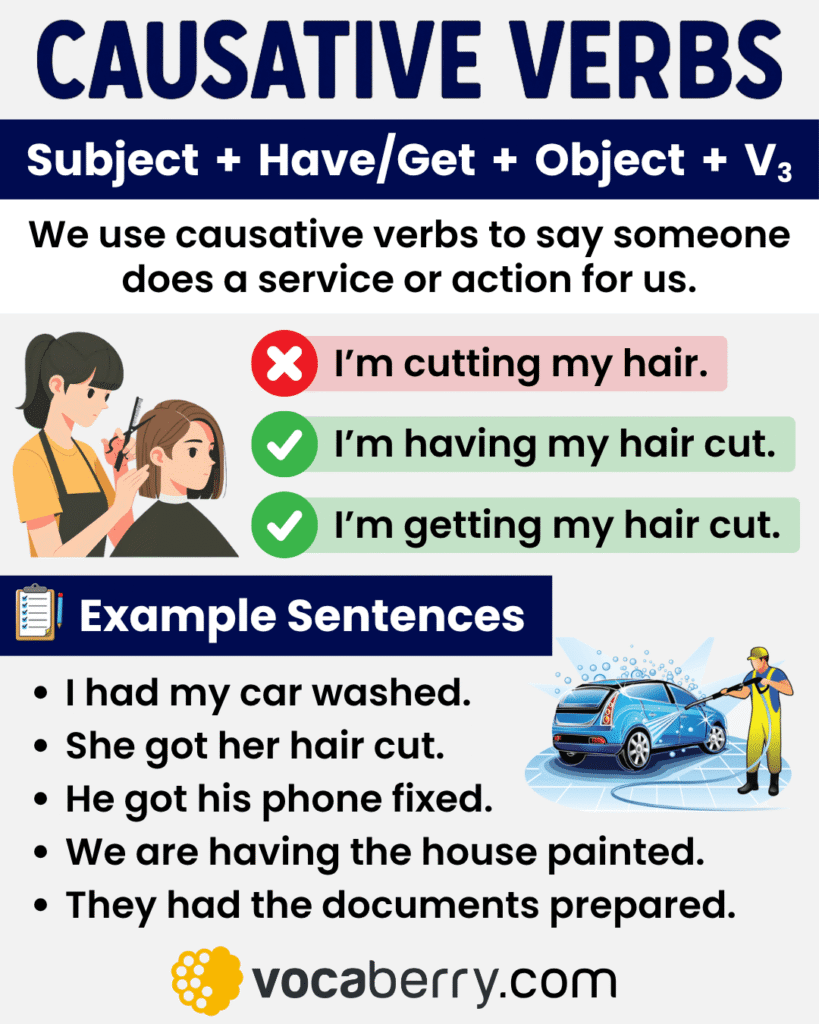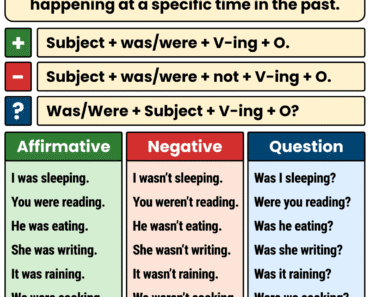
Causative verbs are structures in English that show someone causes another person to do something or that something happens to someone. They are commonly used to describe services, arrangements, or events where the subject is not the person doing the action. The most frequent causative forms use have and get followed by an object and a past participle.
In this article, you will learn what causative verbs are, how to form have/get something done, and see clear examples and usage explanations to help you understand this important part of English grammar.
What Are Causative Verbs?
Causative verbs are verbs used to show that the subject is not doing an action directly but is causing it to happen or arranging for it to be done. They are common in English when talking about services, repairs, instructions, or situations where something happens to you.
The most frequent causative verbs are have and get. These are followed by an object and a past participle. This is often called the causative passive structure because the focus is on what happens to the object rather than who does the work.
For example:
- I had my car cleaned.
- She got her hair cut.
When Do We Use Have/Get Something Done?
We use “have/get + object + past participle” to talk about these situations:
Arranging for someone to do something for us:
This use shows that you ask or pay someone to perform an action.
- I had my hair cut.
- She got her car repaired.
- We are having the house painted.
Describing something negative that happened to us:
This use shows that something happened to you, often without your control.
- She got her phone damaged.
- He had his wallet stolen.
- They got their window broken.
Causative Have
Causative have is used to show that you arrange for someone else to do something for you. This structure is very common when you talk about services, repairs, or any action you do not do yourself.
Structure: Subject + have + object + past participle
- He has his car cleaned every week.
- She had her hair done yesterday.
- They had their house painted last year.
Negative Form: Subject + did not (didn’t) + have + object + past participle
- I didn’t have the documents printed.
- He didn’t have his watch repaired.
Question Form: Did + subject + have + object + past participle?
- Did you have your hair cut?
- Did she have the car serviced?
Causative Get
Causative get has the same meaning as have, but it is usually more informal and common in spoken English. It shows that you arrange for someone to do something for you or that something happens to you.
Structure: Subject + get + object + past participle
- I got my computer fixed yesterday.
- She gets her house cleaned every month.
- They got their driveway repaired.
Negative Form: Subject + did not (didn’t) + get + object + past participle
- I didn’t get my phone fixed.
- He didn’t get his suit cleaned.
Question Form: Did + subject + get + object + past participle?
- Did you get your watch repaired?
- Did she get her hair colored?
Causative Verbs for Negative Events
Causative verbs are often used to talk about unplanned or negative experiences when something happens to you without your intention. This is very common in English to describe situations such as accidents, crimes, or unexpected problems.
In these cases, you still use the structure have/get + object + past participle, but the meaning is different: you did not arrange for the action to happen. It happened to you.
Examples:
- He had his wallet stolen.
- She got her phone broken during the trip.
- They had their car scratched.
- We got our fence damaged in the storm.
Causative Verbs in All Tenses
Causative verbs can be used in all tenses in English. The structure have/get + object + past participle stays the same, but the tense is shown by how you conjugate have or get.
Below you can see examples of causative sentences in different tenses and forms:
- Present Simple: I have my shirts ironed every week.
- Present Continuous: She is having her nails done right now.
- Past Simple: They had the garage cleaned.
- Past Continuous: He was having his car serviced.
- Present Perfect: We have had the house painted.
- Present Perfect Continuous: He has been having his teeth checked regularly.
- Past Perfect: She had had her documents translated before the meeting.
- Future Simple: I will have my hair cut tomorrow.
- Future Continuous: They will be having the carpets cleaned next week.
- Future Perfect: By Friday, we will have had the kitchen remodeled.
- Modals: You should have your eyes tested.
Differences Between Have and Get
Have and get are both used in causative structures and usually mean the same thing: you arranged for someone else to do something for you or something happened to you. However, there are some small differences in how they are used and how formal they sound. Formality:
Have is more neutral and is common in both spoken and written English.
Get is more informal and often used more in conversation.
Examples:
- I had my car repaired after the accident.
- I got my car repaired after the accident.
Including the Agent (By Someone)
Sometimes you want to say who actually performed the action in a causative sentence. This is called including the agent. You can do this by adding by + person at the end of the sentence.
This helps you be more specific and clear about who did the work.
Structure: have/get + object + past participle + by + person
Examples:
- I had my hair cut by a professional stylist.
- She got her house painted by a local company.
- They had their wedding photos taken by a famous photographer.
- He got his documents translated by an expert.
Causative Verbs vs. Active Voice
It is important to understand the difference between causative structures and active voice, because they express different ideas. In the active voice, the subject does the action themselves. In the causative, the subject arranges for someone else to do the action or describes something that happens to them.
Look at these examples to see the difference:
Active Voice:
- I cut my hair.
- She cleaned the house.
- He painted the room.
Causative Verbs:
- I had my hair cut.
- She got the house cleaned.
- He had the room painted.
Examples of Causative Verbs
Below are examples to help you see how have and get are used in everyday English.
Examples with Have:
- I have my hair cut every six weeks.
- She had her car serviced last month.
- We will have the house painted next summer.
- They have had their kitchen renovated.
- Did you have your phone repaired?
- I didn’t have the documents printed.
Examples with Get:
- I got my computer fixed yesterday.
- He gets his shirts cleaned at the laundry.
- She is getting her nails done right now.
- We got the roof repaired after the storm.
- Have you got your car serviced yet?
- He didn’t get the window replaced.
Examples of Causative Verbs for Negative Events:
- He had his wallet stolen while he was shopping.
- She got her phone broken during the trip.
- They had their car scratched in the parking lot.
- We got our fence damaged in the storm.
- I had my laptop stolen at the airport.
- She got her suitcase lost during the flight.
Examples including the agent:
- I had my hair cut by a professional stylist.
- She got her documents translated by an expert.
- We had the windows cleaned by a local company.
- He got his house painted by a contractor.
- They had their garden designed by a landscape architect.
- She got her wedding photos taken by a famous photographer.






